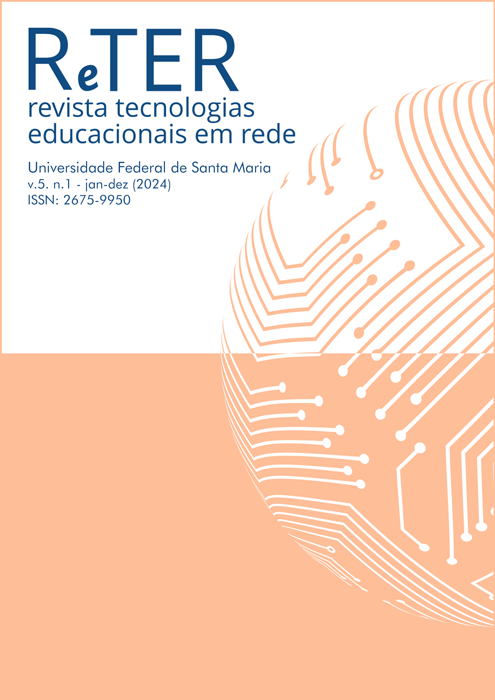THE DISCOURSE OF “DIGITAL NATIVES” IN TEACHER EDUCATION IN THE WESTERN PARÁ STATE, BRAZILIAN AMAZON
DOI:
https://doi.org/10.5902/2675995085877Keywords:
Digital culture, Digital natives, Initial teacher education in the AmazonAbstract
Since its emergence more than two decades ago, the term “digital natives”, coined by Marc Prensky, has become a generic expression to refer to the new subjects of digital culture. Many analyzes and criticisms were made of the term, highlighting discursive problems, mainly in the educational field, a space used by the author to illustrate his arguments. In this sense, the research problematizes the term “digital natives”, analyzing it from its genesis to the discursive applications in the academic environment in a teacher education course in the western Pará State, Brazilian Amazon, in order to understand the limits of use of the term “digital natives” in Amazonian educational realities, considering the emerging identities in the network society and the identity descriptions of the subjects named “digital natives” from Prensky’s perspective. The methodological approach of the research consists of the deepening of the theoretical framework, combined with field research in a Degree in Educational Informatics in the Western Amazon of Pará, with the research participants being higher education teachers and undergraduate students. The results converge towards the necessary understanding and discussion of post-modern identity phenomena, valuing and expanding debates on digital culture in the education of Amazonian teachers, as well as the necessary caution regarding discursive generalizations that frame and standardize subjects, limiting debates in around identity diversity.
Downloads
References
BARDIN, Laurence. Análise de conteúdo. São Paulo: Edições 70, 2011.
BARTOSZECK, Flavio Kulevicz; CZESZAK, Wanderlucy A. A. Corrêa; MATTAR NETO, João Augusto de. Um Exemplo de Sabedoria Digital: a aprendizagem baseada em games. Revista Científica de Educação à distância. Vol. 8 – Nº 14- julho-2016 / ISSN 1982-6109.
BUCKINGHAM, David. Cultura digital, Educação Midiática e o Lugar da Escolarização. Educ. Real., Porto Alegre, v. 35, n. 3, p. 37-58, set./dez., 2010.
CARVALHO, Bruno Leal Pastor de. Nativos digitais, Imigrantes digitais: Quinze anos depois. In. BUENO, André; ESTACHESKI, Dulceli; CREMA, Everton (orgs.). Para um novo amanhã: visões sobre aprendizagem histórica. Rio de Janeiro/União da Vitória: Edição LAPHIS/Sobre Ontens, 2016.
DEMENTSHUK, Márcia; HENRIQUES, Percival. Pássaros voam em bando: a história da internet do século XVIII ao século XXI. João Pessoa, Editora ANID: 2019.
HALL, Stuart. A identidade cultural na pós-modernidade. 11 ed. Rio de Janeiro: DP&A, 2006. Tradução: Tomaz Tadeu da Silva, Guaracira Lopes Louro.
HOWE, N., & STRAUSS, W. (2000). Millennials Rising: The Next Great Generation. In R. J. Matson (Ed.), Cartoons. New York: Vintage Books.
ICDL Europa. The fallacy of the ‘digital native’. 2014. Disponível em: <https://www.icdleurope.org/policy-and-publications/the-fallacy-of-the-digital-native/>. Acesso 15 nov 2021.
KENSKI, Vani Moreira. Educação e Tecnologias: O novo ritmo da Informação. 8ª Ed. Campinas, SP: Papirus, 2007.
PALFREY, John; GASSER, Urs. Nascidos na era digital: entendendo a primeira geração dos nativos digitais. Porto Alegre: Artmed, 2011.
PRENSKY, Marc. Nativos Digitais, Imigrantes Digitais - Part. 1. Tradução de Roberta de Moraes Jesus de Souza. On The Horizon – Estados Unidos – NCB University Press, v.9, n.5, Oct, 2001. Título Original: Digital natives, digital immigrants. DOI: https://doi.org/10.1108/10748120110424816
PRENSKY, Marc. In. GUIMARÃES, Camila. Marc Prensky: “O aluno virou o especialista”. Revista Época. 08 jul 2010. Disponível em: http://revistaepoca.globo.com/Revista/Epoca/0,,EMI153918-15224,00-MARC+PRENSKY+O+ALUNO+VIROU+O+ESPECIALISTA.html. Acesso em 12 fev 2022.
SCHLECHTY, Phillip C. Leading for learning: How to transform schools into learning organizations. Jossey -Bass. San Francisco: EUA, 2009. DOI: https://doi.org/10.1002/9781118269497
SELWYN, Neil. The digital native – myth and reality. Aslib Proceedings: New Information Perspectives Vol. 61 No. 4, 2009 pp. 364-379. DOI: https://doi.org/10.1108/00012530910973776
SIBILIA, Paula. A escola no mundo hiperconectado: redes em vez de muros? Matrizes, São Paulo, ano 5, n. 2, p. 195-211, 2012.
TAPSCOTT, Don. A hora da geração digital: como os jovens que cresceram usando a internet estão mudando tudo, das empresas aos governos. Rio de Janeiro: Agir Negócios, 2010.
VEEN, Wim; VRAKKING, Ben. Homo Zappiens: educando na era digital. Porto Alegre: Armed, 2009. Tradução: Vinícius Figueira.
Published
How to Cite
Issue
Section
License
Autores que publicam nesta revista concordam com os seguintes termos:
- Autores mantém os direitos autorais e concedem à revista o direito de primeira publicação, com o trabalho simultaneamente licenciado sob a Licença Creative Commons Attribution que permite o compartilhamento do trabalho com reconhecimento da autoria e publicação inicial nesta revista.
- Autores têm autorização para assumir contratos adicionais separadamente, para distribuição não-exclusiva da versão do trabalho publicada nesta revista (ex.: publicar em repositório institucional ou como capítulo de livro), com reconhecimento de autoria e publicação inicial nesta revista.
- Autores têm permissão e são estimulados a publicar e distribuir seu trabalho online (ex.: em repositórios institucionais ou na sua página pessoal) a qualquer ponto antes ou durante o processo editorial, já que isso pode gerar alterações produtivas, bem como aumentar o impacto e a citação do trabalho publicado, com reconhecimento de autoria e publicação inicial nesta revista.










